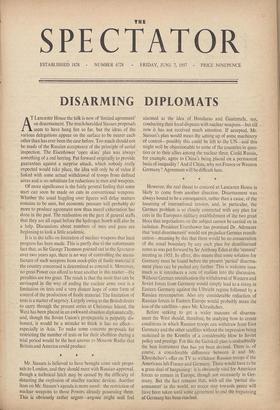DISARMING DIPLOMATS
T Lancaster House the talk is now of 'limited agreement' on disarmament. The much-heralded Stassen proposals seem to have hung fire so far, but the ideas of the various delegations appear on the surface to be nearer each other than has ever been the case before. Too much should not be made of the Russian acceptance of the principle of aerial inspection. The Eisenhower 'open skies' plan was always something of a red herring. Put forward originally to provide guarantees against a surprise attack, which nobody really expected would take place, the idea will only be of value if linked with some actual withdrawal of troops from defined areas and is no substitute for reductions in men and weapons.
Of more significance is the fairly general feeling that some start can soon be made on cuts in conventional weapons. Whether the usual haggling over figures will delay matters remains to be seen, but economic pressure will probably do more to produce agreement now than moral exhortation has done in the past. The realisation on the part of general staffs that they are all equal before the hydrogen bomb will also be a help. Discussions about numbers of men and guns are beginning to look a little academic.
It is in the talks on limitation of nuclear weapons that least progress has been made. This is partly due to the unfortunate fact that, as Sir George Thomson pointed out in the Spectator over two years ago, there is no way of controlling the manu- facture of such weapons from stock-piles of fissile material if the country concerned is determined to conceal it. Moreover, no great Power can afford to trust another in this matter—the penalties are too great. The result is that the most that can be envisaged in the way of ending the nuclear arms race is a limitation on tests and a very distant hope of some form of control of the production of fissile material. The limitation of tests is a matter of urgency. Largely owing to the British.desire to carry through the present series at Christmas Island, the West has been placed in an awkward situation diplomatically, and, though the Soviet Union's propaganda is palpably dis- honest, it would be a mistake to think it has no effect— especially in Asia. To make some concrete proposals for restricting the number of tests or for their abolition during a trial period would be the best answer to Moscow Radio that Britain and America could produce.
* * * Mr. Stassen is believed to have brought some such propo- sals to London, and they should meet with Russian approval, though a technical hitch may be caused by the difficulty of detecting the explosion of smaller nuclear devices. Another item on Mr. Stassen's agenda is more novel : the restriction of nuclear weapons to those Powers already possessing them. This is obviously rather urgent—anyone might well feel alarmed at the idea of Honduras and Guatemala, say, conducting their local disputes with nuclear weapons—but till now it has not received much attention. If accepted, Mr. Stassen's plan would mean the setting up of some machinery of control—possibly this could be left to the UN—and this might well be objectionable to some of the countries in ques- tion or to their allies among the nuclear three. Could Russia, for example, agree to China's being placed on a permanent basis of inequality? And if China, why not France or Western Germany? Agreement will be difficult here.
However, the real threat to concord at Lancaster House is likely to come from another direction. Disarmament was always bound to be a consequence, rather than a cause, of the lessening of international tension, and, in particular, the German problem is so closely connected with any plan for cuts in the European military establishment of the two great blocs that negotiations on the subject cannot be carried on in isolation. President Eisenhower has promised Dr. Adenauer that 'total disarmamerit' would not prejudice German reunifi- cation—meaning by this that there would be no consecration of the zonal boundary by any such plan for demilitarised zones as was put forward by Sir Anthony Eden at the 'summit' meeting in 1955. In effect, this means that some solution for Germany must be found before the present 'partial' disarma- ment plans can be pushed any farther. This is welcome inas- much as it introduces a note of realism into the discussion. Without German reunification the withdrawal of Western and Soviet forces from Germany would simply lead to a rising in Eastern Germany against the Ulbricht regime followed by a Russian reoccupation. Also any considerable reduction of Russian forces in Eastern Europe would probably mean the loss of the satellites—pace Mr. Khrushchev.
Before seeking to get a wider Measure of disarma- ment the West should, therefore, be studying how to create conditions in which Russian troops can withdraw from East Germany and the other satellites without the impression being sustained in the Kremlin of: a considerable blow to Soviet policy and prestige. For this the Gaitskell plan is undoubtedly the best instrument that has yet been devised. There is, of course, a considerable difference between it and Mr. Khrushchev's offer on TV to withdraw Russian troops if the Americans left France and Germany. There would have to be a great deal of bargaining,: it is obviously vital for American forces to remain in Europe, though not necessarily in Ger- many. But the fact remains that, with all the 'partial dis- armament' in the world, no major step towards peace will have been taken until some agreement to end the trepanning of Germany has been reached.


































 Previous page
Previous page